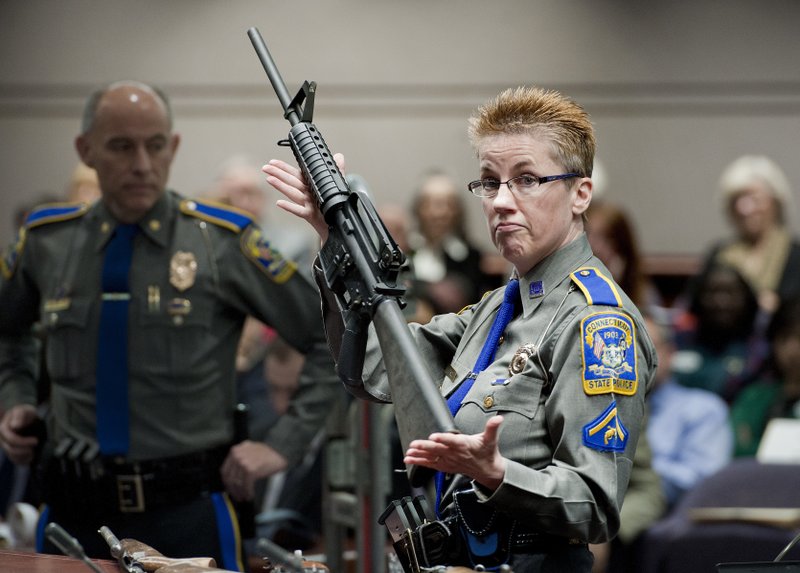The Supreme Court said Tuesday that a survivor and relatives of victims of the Sandy Hook Elementary School shooting can pursue their lawsuit against the maker of the rifle used to kill 26 people.
The justices rejected an appeal from Remington Arms, which argued it should be shielded by a 2005 federal law preventing most lawsuits against firearms manufacturers when their products are used in crimes.
The case is being watched by gun control advocates, gun rights supporters and gun manufacturers across the country because it has the potential to provide a roadmap for victims of other mass shootings to circumvent the federal law and sue the makers of firearms.
The court’s order allows the lawsuit filed in Connecticut state court by a survivor and relatives of nine victims who died at the Newtown, Connecticut, school on Dec. 14, 2012, to go forward.
The lawsuit says the Madison, North Carolina-based company should never have sold a weapon as dangerous as the Bushmaster AR-15-style rifle to the general public. It also alleges Remington targeted younger, at-risk males in marketing and product placement in violent video games. Opponents of the suit contend that gunman Adam Lanza alone is responsible for killing 20 first graders and six educators. He was 20 years old.
“I support the Second Amendment and the right to own firearms and guns, but on the other hand there’s reckless advertising and marketing,” said Neil Heslin, whose son, Jesse Lewis, died in the shooting. “There should be accountability and responsibility for that.”
The families’ lawyer, Joshua Koskoff, said the next step will be the discovery phase in which Remington will be compelled to disclose certain internal company documents.
“The families are just universally happy with this result,” he said. “They have wanted nothing more out of this case than to shed light on the conduct of the manufacturer of the weapon that was the source of taking the lives of their loved ones.”
Messages seeking comment were left with lawyers for Remington Arms on Tuesday.
A leading gun industry group, the National Shooting Sports Foundation, which happens to be based in Newtown, said it was disappointed the Supreme Court declined to review the case but is confident Remington will win in the trial court.
“Nothing in Remington’s advertising of these products connotes or encourages the illegal or negligent misuse of firearms,” the group said in a statement. “We continue to feel sympathy toward the Sandy Hook victims, as NSSF is headquartered in Newtown, but Adam Lanza alone is responsible for his heinous actions.”
Before the school shooting, Lanza shot his mother to death at their Newtown home. He killed himself as police arrived at the school. The rifle was legally owned by his mother.
The Connecticut Supreme Court had earlier ruled 4-3 that the lawsuit could proceed for now, citing an exemption in the federal law. The decision overturned a ruling by a trial court judge who dismissed the lawsuit based on the 2005 federal law, named the Protection of Lawful Commerce in Arms Act.
The majority of justices in the state Supreme Court ruling, however, said it may be a “Herculean task” for the families to prove their case at trial.
The federal law has been criticized by gun control advocates as being too favorable to gun-makers. It has been cited by other courts that rejected lawsuits against gun-makers and dealers in other high-profile shooting attacks, including the 2012 Colorado movie theater shooting and the Washington, D.C., sniper shootings in 2002.
The National Rifle Association, 10 mainly Republican-led states and 22 Republicans in Congress were among those urging the U.S. Supreme Court to jump into the case and end the lawsuit against Remington.
Democratic lawmakers from Connecticut, including Sens. Richard Blumenthal and Chris Murphy and Rep. Jahana Hayes, said in a statement that the 2005 federal law needs to be repealed.
“For years, gun manufacturers have been allowed to operate with near-blanket immunity — producing weapons of war and marketing them to the masses with zero accountability,” they said. “This critical victory reinforces the need for Congress to pass legislation repealing the gun industry’s sweetheart immunity deal and unlocking the doors to justice for all victims of gun violence.”
(AP)












3 Responses
I eagerly anticipate the ability to sue car manufacturers for crashes, ski mask manufacturers for robberies, and computer manufacturers for viruses.
If the car manufacturers didn’t put brakes in the car, then yeah, that would make sense.
If the ski mask manufacturers marketed specifically to robbers, again, I would understand.
And if computer manufacturers left back doors in their systems, then again, that makes total sense.
So if a company markets real guns to people who play video games where they shoot fake ones at fake people, why not hold them responsible when the guy uses a real gun to shoot real people.
What they allowed was an ADVERTISING suit to go forth. They can sell guns all they want, but if they say this is a gun designed for shooting lots of people (which is not a lawful use) they can be sued. By that logic, if a ski make company advertises their mask’s utility for hiding one’s face during a robbery, or a computer manufacturer boasts how their machine is well suited for hacking into other people’s accounts, they would be liable. The limited rule will not be very disruptive to commerce.